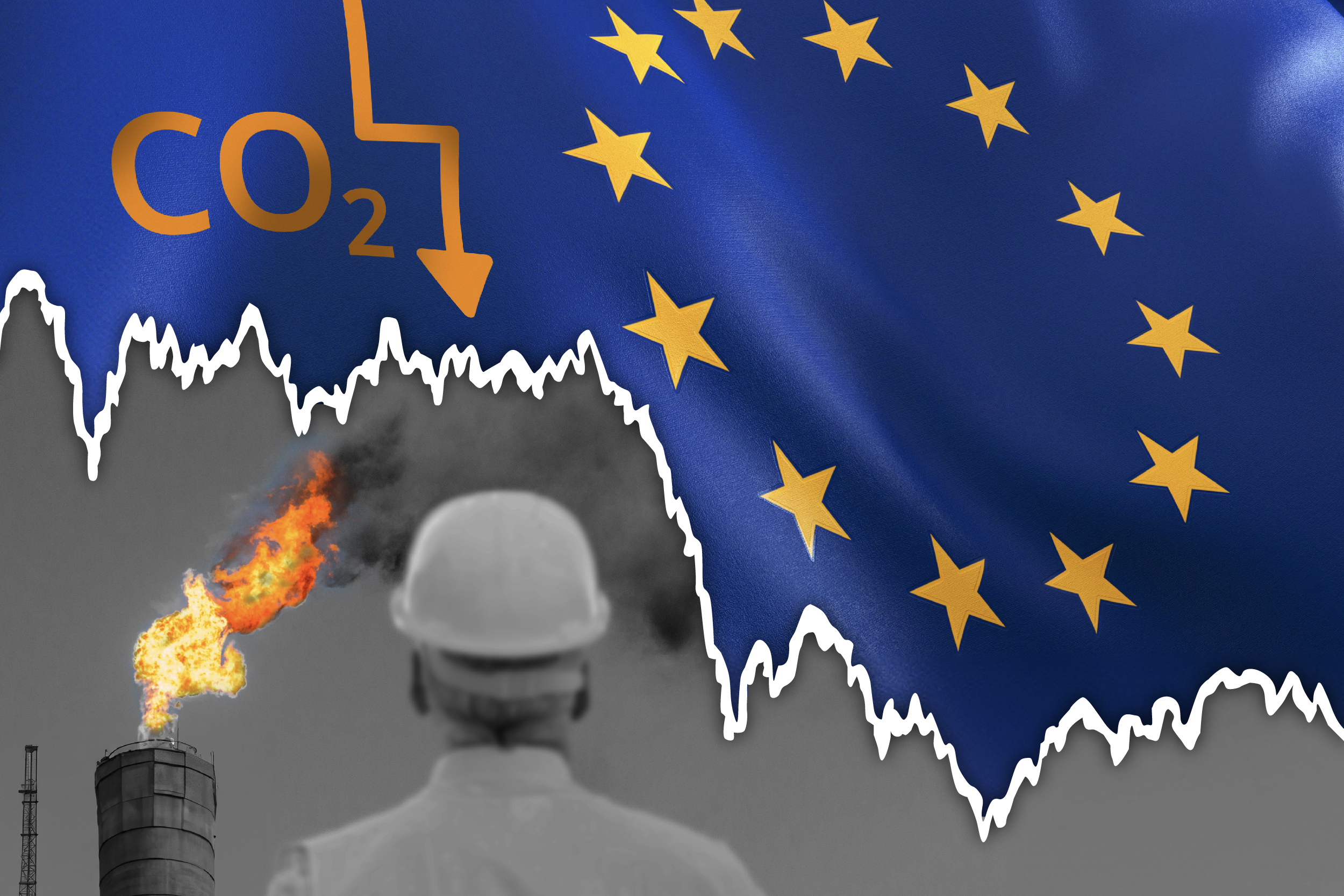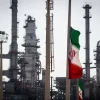Less than a week after the $750 billion energy export deal from the U.S. to Europe, Brussels is now facing a challenge in the form of the European Union’s new methane regulations.
These regulations threaten U.S. liquefied natural gas (LNG) exports, but industry stakeholders and lobbyists are pressuring Europe to overlook them.
According to Gas Bonyan, Sharon Kelly, in a report published by DeSmog, cites Charlie Riedl, Executive Director of the Center for LNG in America, stating: On July 28, the United States and the European Union announced a framework for a trade agreement.
Under this agreement, Europe has committed to purchasing $750 billion worth of oil, LNG, and nuclear fuel from the U.S. by 2028. However, energy experts have described this target as “unrealistic,” particularly given the uncertain implications of this deal for Europe’s methane standards.
U.S. Lobbyists’ Efforts to Undermine Europe’s Climate Standards
As trade negotiations between the U.S. and the EU accelerate, lobbyists representing America’s largest natural gas exporters are working to create a loophole in Europe’s new methane regulations.
They are using tariff and trade tensions as leverage to weaken Europe’s climate standards.
“It’s abundantly clear that the gas industry and the U.S. State Department are pushing Europe to waive these methane regulations and commit to our dirty gas.”
— Lauren Stackman, Research Director at Oil Change International, refers to a report examining the climate impacts of five U.S. LNG projects, emphasizing: “We hope Europe doesn’t back down under this pressure. This issue is critically important.”
Challenges in Measuring and Complying with Methane Regulations
With the August 1 deadline for the trade agreement with the Trump administration approaching, U.S. gas exporters are concerned about their inability to answer a key question from European regulators: “How much methane pollution is emitted from your LNG?”
Charlie Riedl, speaking at the Reuters Global Energy Transition conference on June 26, said: “There are doubts about our actual ability to comply with methane regulations. This issue has delayed contract negotiations and final investment decisions.”
Currently, about 75% of U.S. LNG exports go to Europe. However, Riedl says U.S. companies are likely not only unable to comply with Europe’s standards but also lack the capability to accurately measure methane pollution in each shipment.
“We’ll likely face significant challenges in implementing Europe’s regulations. If these rules aren’t revised or relaxed, our market development in Europe could face serious obstacles in the future.”
Companies Betting on Looser Regulations
Riedl notes that some companies continue to sign contracts despite these challenges, betting that the U.S. will find a way to bypass the regulations.
“Some companies are simply banking on being able to deliver their gas to Europe, or that methane regulations will be revised, or something like equivalency will be introduced to get around them.”
Secret Clause in the Trade Agreement?
According to the Wall Street Journal in June, the initial draft of the trade agreement included a “methane regulation exemption for the U.S.” However, European Commission President Ursula von der Leyen told reporters: “Europe’s sovereignty in its decision-making process is absolutely non-negotiable.”
Under the methane regulations approved in 2024, these rules will be fully implemented by 2030, and new LNG import contracts from that date must comply with methane limits and disclose the necessary information.
Penalty Discounts? Bypassing Regulations from Within
Even if Europe does not grant an exemption in its agreement with Trump, lobbyists are still proposing other ways to neutralize the regulations. One such proposal is reducing penalties.
Riedl says: “Alright, fine, we’ll set the penalty at one dollar and consider the matter settled; then let the Commission try to force us to do anything.”
“I think ideas like this make it very difficult for the EU to enforce these regulations at the national level.”
The Core Issue: Measuring Methane
Methane is a colorless, odorless gas that must be kept at extremely low temperatures (close to those of Jupiter and Saturn) to remain liquid. Methane leaks can occur at any point in the gas supply chain, from wells to household valves.
There are millions of potential leak points. The U.S. Environmental Protection Agency (EPA) estimates that about 1% of total gas production leaks as methane.
However, field studies and aerial imagery have shown that this figure is unrealistic, with actual amounts being significantly higher.
Climate Impact: Billions in Damages
A recent report by Global Witness estimates that U.S. LNG imports to Europe since 2022 will cause over €100 billion in climate damages from natural disasters. This calculation uses the Biden administration’s social cost of carbon model.
Public Exposure and Scandal
Under the EU’s new regulations, gas importers are required to provide precise data on methane leaks. This data will be made public, allowing the European Commission to employ a “name and shame” tactic.
Oil and gas lawyers have warned that these regulations will significantly impact negotiations for new LNG contracts.
“We’re already seeing the direct impact of the EU’s methane regulations on LNG sales negotiations.”
Meanwhile, gas producers have always claimed that regulations are unnecessary, as financial incentives are sufficient to prevent leaks. However, reality shows otherwise: “Methane emissions have grown almost in lockstep with increased production. So, it’s clear this is a structural problem.”
Stackman says methane leak detection cameras have recorded consistent leaks month after month at the same sites, with no fines or enforcement.
At the federal level, there’s little sign of improvement. Stackman told DeSmog: “This administration is dismantling the methane regulations the Biden administration tried to implement.”
This lack of regulation undermines a key selling point of U.S.-produced natural gas—that buying from here is better than, say, Russia.
Stackman said: “In these conditions, the U.S. is no longer a country that produces oil and gas better than anyone else. That’s a myth.”
Moreover, U.S. LNG doesn’t just compete with other natural gas exporters like Russia. Natural gas is one energy source among many.
In a new report by Greenpeace, Earthworks, and Oil Change International, the U.S. Department of Energy’s modeling methods were used to assess the overall impact of new LNG projects on climate issues. The findings show that LNG not only replaces other fossil fuels but can also displace renewable energy.
Thomas Glyn, an environmental and energy activist with Greenpeace EU, said: “EU leaders must break free from fossil fuels and take control of Europe’s future by investing in a secure, peaceful, and renewable energy system. Banning all new fossil fuel projects in the EU would be the right first step, and the EU certainly shouldn’t consider funding oil and gas projects abroad.”
Uncertainty About Future Demand
The EU’s methane disclosure requirements are not the only concern for potential U.S. LNG exporters.
Riedl, at the Reuters conference, said one of the main challenges is the belief that Europe’s demand for natural gas may decline before new LNG terminals are operational.
He said: “What I’m not hearing from our members is concern about financing. What I’m hearing is that the main issue is securing long-term sales contracts.”
He added: “That’s the problem right now… especially from Europe, they’re saying, ‘Well, we’re phasing out gas by 2035.’”
The Role of Russian Gas in the Geopolitical Energy Equation
Beyond issues related to U.S. LNG exports, the Ukraine war and Russian gas remain one of the most critical pieces of the geopolitical energy puzzle.
According to Riedel, although many international actors wish for an end to the war in Ukraine, it must be acknowledged that the resumption of Russian pipeline gas imports would have a direct and substantial impact on the U.S. LNG export market.
He emphasized that the price of Russian pipeline gas for Europe would be “much lower” than U.S. LNG exports — to the extent that it could be considered “pocket change” compared to the dollar. From his perspective, this reality could clearly undermine U.S. gas exports to Europe.
However, Riedel stressed that the overall picture of the U.S. LNG industry is not entirely discouraging and should not be viewed solely as a difficult battlefield.
In his remarks, he pointed to a range of domestic challenges, mainly stemming from regulatory policy instability and investors’ lack of confidence in the U.S. legal system. He also mentioned issues such as labor shortages, increased costs due to tariffs on steel and aluminum, and their potential implications for infrastructure projects.
Riedel further highlighted the unpredictable approach of the Trump administration in trade negotiations, noting that the U.S. government simultaneously pressures other countries to buy more American gas while making the export process more difficult for itself. According to him, this contradictory behavior partly aligns with the patterns of the current administration.
In this context, Stockman raised concerns about the European Union’s response to U.S. pressures, particularly regarding methane emission regulations. He observed signs of hesitation among European negotiators, as the EU has little interest in jeopardizing its export market to the United States.
Nevertheless, he urged European officials to resist these pressures and to enforce their methane regulations rigorously and without exception.






